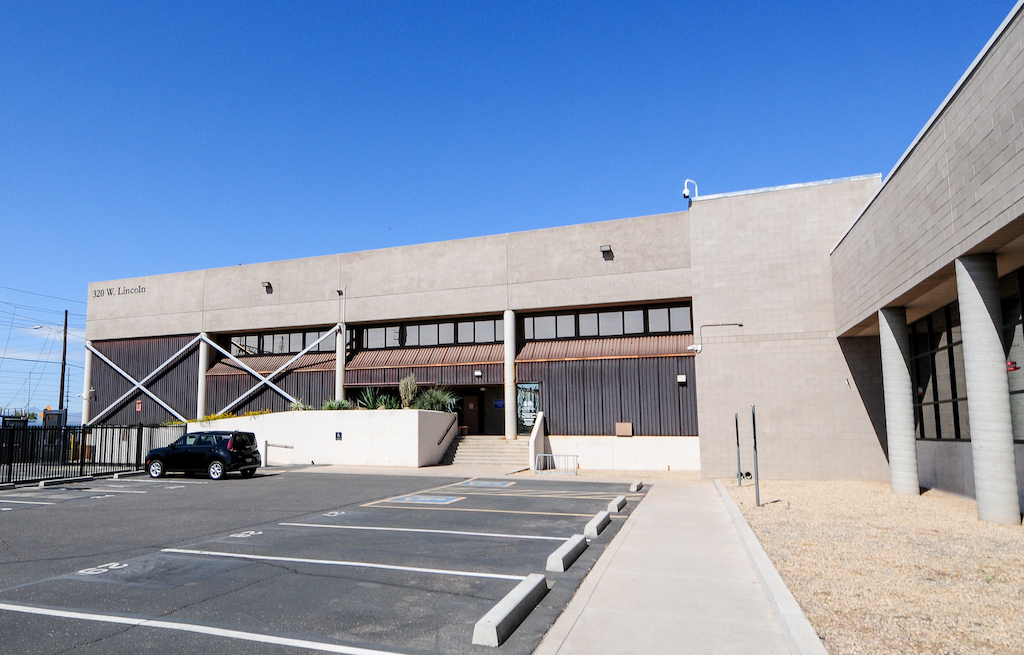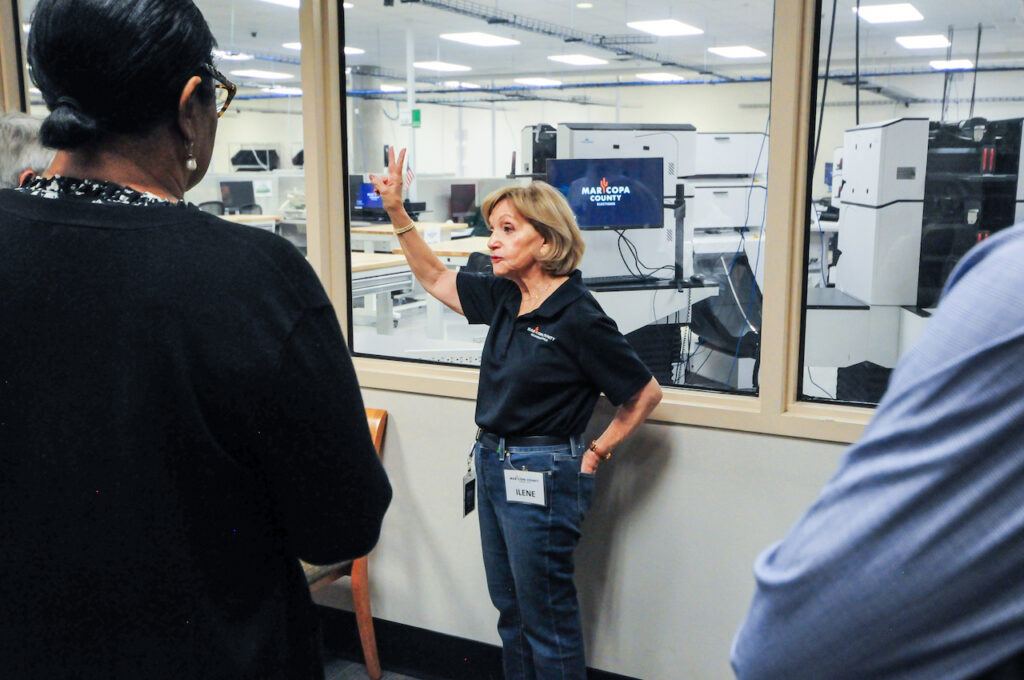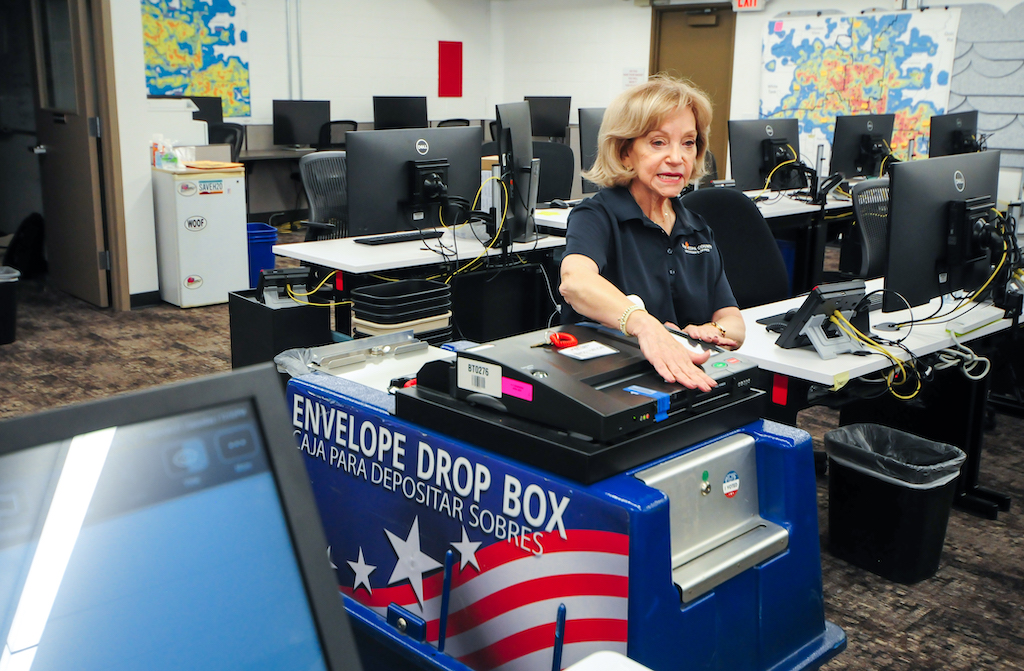(Phoenix, Arizona) — Voting is a fundamental right in a democracy. But what happens to the ballots after citizens have cast their vote? How does it travel from the voter to the final tally that influences the direction of a city, state, or nation?
After a vote is cast, a complex, meticulous process begins. This process, marked by advanced technology, strict security measures, and careful human oversight, ensures the transparency and integrity of elections.
The Maricopa County Tabulation and Election Center (MCTEC) in Phoenix, Arizona, plays a crucial role in this process. This public institution is responsible for the careful processing and counting of millions of ballots cast by eligible voters across the county.
Related → Polarization and division in American politics from the 2000 Election to 2024
Maricopa County, the fourth-largest county in the nation and the fastest-growing, has a population exceeding four million residents. More than half of these residents are registered voters, making it the second-largest electoral jurisdiction in the United States.
In the aftermath of the 2020 presidential elections, MCTEC drew national attention amid protests driven by dissatisfaction with the results. Supporters of then-President Donald Trump gathered outside the facility, fueled by allegations of electoral fraud. This scrutiny created a tense atmosphere, with chants of “Stop the steal!” echoing around MCTEC.

A guided tour of MCTEC, where ballots are tallied
A recent visit to MCTEC provided a firsthand look at the center’s operations and infrastructure. Ilene Haber, Director of Constituent Services at the Maricopa County Recorder’s Office, guided the group through the various stages of receiving and scanning ballots, signature verification, vote validation, resolution of discrepancies, and the tabulation process. Haber explained how bipartisan teams of election workers carefully examine ballots to address any ambiguity or inconsistency during tabulation.
Tour participants gained insights into voting regulations and potential challenges in the ballot’s journey from the voter to the final tally. They also learned about the electronic systems that support this process.
Democracy allows citizens to actively participate in decisions that shape their lives and communities. Technological innovations, such as tabulation machines, along with the human element of election officials and voters, facilitate this participation. Technology speeds up voter identification and registration, ballot processing, and tabulation, while human oversight ensures transparency, security, and the legitimacy of the electoral process.
In Maricopa County, the voting and tabulation process goes beyond in-person voting, extending to the counting of early and provisional ballots. The latter helps resolve any uncertainties regarding voter eligibility or registration.
In the wake of the 2020 elections and with the 2024 electoral contest approaching, election officials have the added responsibility of debunking any misinformation surrounding the electoral process. The deliberate spread of misinformation, conspiracy theories, propaganda, and fake news has cast a shadow over the electoral landscape. As a result, government entities at all levels are taking decisive measures to counter these harmful effects.

Enhanced electoral infrastructure and ballots
As one of the most populous counties in the United States, Maricopa faces logistical and security challenges in processing a large volume of votes. To ensure the secure transportation of ballots from polling locations to MCTEC, officials work closely with law enforcement, using secure vehicles and careful process tracking.
Secure storage facilities protect ballots before and after tabulation, while the ability to efficiently handle a large volume of ballots depends on modern equipment and skilled personnel.
Additional security measures are necessary to protect the process against external threats. These include countermeasures against hacking, prevention of electoral fraud, and protection of workers and MCTEC’s premises against threats such as vandalism and violence.
Transparency and communication are fundamental principles for keeping voters informed and addressing their concerns about the integrity of the electoral process. Guided tours at MCTEC highlight officials’ commitment to transparency and voter education.
Effective human resource management is crucial in ensuring adequate training and staffing, as well as effectively managing the workload during elections. The record-breaking count of over two million ballots during the 2020 presidential elections underscores the need to proactively address these challenges.
In addition to these measures, bold security initiatives have been implemented. These include error-proof ballot boxes, round-the-clock surveillance via live cameras at MCTEC accessible online, restricted access to the tabulation area, signature verification conducted by trained and certified personnel using graphology techniques, and tamper-resistant ballots. These measures build confidence in the electoral process, ensuring the accurate and fair counting of every vote.
As the 2024 elections approach, the combination of technological innovation and robust security protocols, supported by bipartisan oversight, is essential in maintaining public trust in the democratic process.
Safeguarding democracy against disinformation
After the MCTEC tour, it’s clear that Maricopa County’s tabulation process combines technological innovation with strict safeguards to protect the integrity of every vote. Transparency and accuracy are key to robust electoral administration, building trust in the democratic system.
Disinformation poses a significant challenge to democracy in an era marked by the widespread use of digital technology. Anonymous individuals, public figures, and politicians use social media platforms to spread false information, creating doubt and discord.
Election workers, who play a crucial role in democracy, find themselves on the front lines of these attacks. They face intimidation and harassment, both online and offline, in a coordinated effort to undermine their work and question the integrity of the electoral process.
Despite evidence and assurances from election officials, some individuals continue to spread disinformation, particularly after electoral defeat. Despite compelling evidence to the contrary, these individuals persist in rejecting the outcome, choosing instead to promote unfounded narratives of fraud and corruption.
This behavior can erode trust in the electoral system and potentially impact the stability of democracy. As a result, officials must intensify their efforts to combat disinformation and protect election workers from intimidation and harassment, thereby safeguarding the integrity of elections and preserving the foundations of democracy.
The voter’s imperative
The responsibility of ensuring the integrity of the electoral process rests not only with election officials but also with the electorate. Voters must prepare themselves to cast their votes effectively, ensuring that their voices are heard in the democratic process. Voter education and preparedness are critical in this endeavor.
Voters need comprehensive instruction about the electoral process. Understanding the tabulation mechanism and being aware of security measures are crucial in building confidence in election results. A guided tour of MCTEC’s facilities can help achieve these objectives.
Moreover, voters must be discerning, distinguishing between verifiable information and unfounded rumors. Consulting reputable sources and avoiding the spread of baseless claims are essential to preserving the integrity of the electoral process.
Voters can improve their preparedness by:
• Conducting thorough research on candidates and their political platforms to inform decision-making at the polls.
• Verifying their voter registration and ensuring its accuracy. Visit BeBallotReady.Vote
• Familiarizing themselves with their polling place’s location and operational hours.
• Participating as election observers, actively engaging in overseeing the electoral process.
• Attending debates and political forums to gain deeper insights into candidates’ positions on key issues.
• Relying on official websites and government resources for accurate information, thereby facilitating informed and effective electoral participation.
Preserving the integrity of democracy
As the 2024 elections approach, the importance of voting, a fundamental right and cornerstone of democracy, becomes more pronounced. Understanding the complex processes behind each vote — from ballot tabulation at MCTEC to fighting misinformation — is key to preserving the integrity of the U.S. electoral process.
Transparency, voter education, and the protection of election workers are essential pillars on the path toward fair elections.
This article is for journalistic purposes only and aims to provide information to the public about the U.S. elections. Barriozona Magazine does not endorse or promote any candidate, party, or specific political agenda. Our goal is to offer an impartial analysis of the data and facts surrounding the electoral process in 2024 in the United States.
© 2024, Eduardo Barraza. All rights reserved.




